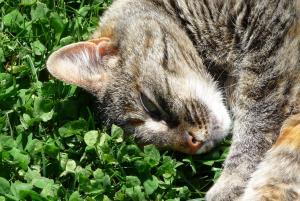What Do Cats Need for a Proper Diet?
- posted: Nov. 27, 2016

What Should I Feed My Cat?
We doctors at Patton Veterinary Hospital are often asked about food and diets for both cats and dogs. What brand? How much to feed? Canned or dry? Food ads and labels can be confusing and overwhelming. Here is some information to try to demystify what to feed your finicky feline.
Cats are what are known as obligate carnivores meaning they must consume meat and protein to survive. Their systems do not process carbohydrates well and feeding them high levels of carbs can lead to weight gain and sometimes other medical problems. Cats are also not small dogs and have very different nutritional requirements than their canine counterparts, so, never feed dog food to a cat. It’s okay if your cat happens to sample a few pieces of dog food, but cats need to eat cat food as their main diet.
Most veterinarians now advocate feeding canned cat food or at least a combination of canned or dry foods. Canned cat foods tend to be higher in both moisture and protein than dry foods which are important dietary considerations for cats. Cats are desert creatures and do not tend to drink large amounts of water. This can lead to urinary tract problems for some kitties, especially males who can experience a urinary tract blockage or obstruction.
Cats also need some specific amino acids like carnitine and taurine as part of their diet to stay healthy. A 10lb cat needs about 25 grams of protein per day. An ideal diet contains about 50% protein, 40% fat and 10% carbohydrate. However, cats with kidney disease or other medical issues may need lower protein diets. You do not necessarily need to change your cat’s food when he or she becomes a senior at about age eight to ten, but do discuss his or her diet with your veterinarian.
Cats are all about textures though, and some do not care for canned foods or will only eat certain sizes or shapes of dry foods or certain textures of canned foods (for instance, soft pate vs. “chunks and gravy”). If your cat refuses to eat a canned diet or develops vomiting or diarrhea as a result of a diet, try a high protein dry food or a different canned version. Bottom line: Buy the best quality food you can afford and make sure the label has the AAFCO seal (Association of American Feed Control Officials) meaning that the food has been tested for proper nutrition by actually feeding it to animals.
If you are trying to change your cat’s diet, a trick that may help is to offer two separate bowls instead of mixing the diets together. Gradually put less of the old food in one bowl and more of the “new” diet into the other to gradually get your cat used to the new diet.
Cats who suddenly stop eating a particular food or who seem to have trouble picking up pieces of food or chewing their food may have medical problems such as dental disease, kidney or liver disease or other problems, so, any time your cat has a change in his or her eating habits, have your cat examined by your veterinarian.
This blog brought to you by the Patton Veterinary Hospital serving Red Lion, York and the surrounding communities.
Location
Patton Veterinary Hospital
425 E Broadway
Red Lion, PA 17356
